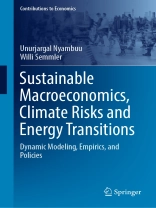Given the industrialized world’s historical dependence on fossil fuel-based energy resources and the now-realized perils of moving beyond the earth’s carbon budget, this book explores the myriad challenges of climate change and in reaching a low-carbon economy. Reconciling the medium-term competing, yet frequently complementary, needs for transition policies, the book provides guidelines for complex and often conflicting climate policy tasks.
The book will appeal to scholars and students of economics and environmental science. It is also relevant for policymakers and practitioners in multilateral institutions, research institutions as well as governments and ministries of countries interested in alternative energy sources, climate economists, and those who study the implementation of sustainable and low carbon-based policies.
Tabla de materias
Chapter 1 – Introduction.- Chapter 2 -Sustainable Growth, Welfare and Short-termism.- Chapter 3 – Non-Sustainable Growth, Resource Extraction, and Boom-Bust Cycles.- Chapter 4 – Fossil Fuel Resources, Environment and Climate Change.- Chapter 5 – Limits on the Extraction of Fossil Fuels, – Chapter 6 – Fossil Fuel Resource Depletion, Backstop Technology, and Renewable Energy.- Chapter 7 – Transition to a Low Carbon Energy System.- Chapter 8 – The Private Sector – Energy Transitions and Financial Market.- Chapter 9 – The Public Sector – Energy Transition and Fiscal and Monetary Policies.- Chapter 10 – Delaying Forces and Climate Negotiation – Games, Lock-ins, Leakages, and Tipping Points.- Chapter 11 – Climate Risks, Sustainable Finance, and Climate Policy.- Chapter 12 – Concluding Remarks.
Sobre el autor
Unurjargal Nyambuu is an economist and professor in the Department of Social Science, the New York City College of Technology, CUNY (USA). She is also a research fellow in Finance and Risk Engineering at NYU’s Tandon School. Dr. Nyambuu previously served as an economist with the Central Bank of Mongolia.
Willi Semmler is the Henry Arnhold Professor of International Cooperation and Development at the New School for Social Research in New York (USA). There, he directs the Schwartz Center for Economic Policy Analysis’ Economics of Climate Change project. He is also a senior researcher at IIASA, Laxenburg (Austria), a research fellow at La Sapienza University (Rome) and affiliated with the University of Bielefeld (Germany).












